Content warning throughout, for discussion of sexual violence and racism, including examples of racist language.
A few weeks ago we literally had to extend our Billy bookcases, as this year’s Christmas haul had joined last year’s unshelved presents. So, the question came up: why would we give shelf space to writers we really don’t want there? Whose works are you willing to be in dialogue with, even when they and their authors are not perfect? Whose works do reflect who you are? And which works and authors cause embarrassing silences at the table?
Death of the Author, in short, is the theory that argues that creation and creator are unrelated. There are many facets to this, and your personal mileage may vary: what one puts up with, another will not. Emotions may come into play here, but principles too. For me, death of the author doesn’t wash, as what an author says and does is of influence on how I perceive their work. This extends to writers, filmmakers, musicians and visual artists. Critics may say that this is Cancel Culture, yet as a consumer I have the right to choose what I consume, just as publishers have the right to choose what they publish, and can choose whether or not to listen to calls from the public to publish – or not – a writer/artist. And if they are published, we can choose whether or not to financially support that work.
These choices are not always based on what’s legal. Material proof of Marilyn Manson’s abuse of Evan Rachel Wood has yet to be produced. Yet, her testimony is powerful and convincing, as are the reports of others who have experienced similar abuse. I believe her. But what to make of the hordes of men (mainly men) in the comments sections of entertainment websites, with their cries of “pics or it didn’t happen”? What climate does this create for any woman who suffers sexual or other abuse, when the default setting at coming forward is not being believed?
When will the Didn’t happen crowd be satisfied? Amber Heard did come with the pictures, yet it was easily spun as “self inflicted” and “she abused Johnny Depp first”. What proof will men be satisfied with, when in the UK less than 5% of rape cases reported to the police are referred to the Crown Prosecution Service, and of these, only three quarters make it to court? And what chance do women stand in court, when the defence attacks their morality and underwear, whereas the promising future of young men must not be compromised? And as for Marilyn Manson, if his own words are explained away as “That’s just his media persona talking,” can I understand why women feel embattled and a #metoo movement sprung up? Yes, I can. Does it affect how I listen to Manson’s music? Oh, yes!
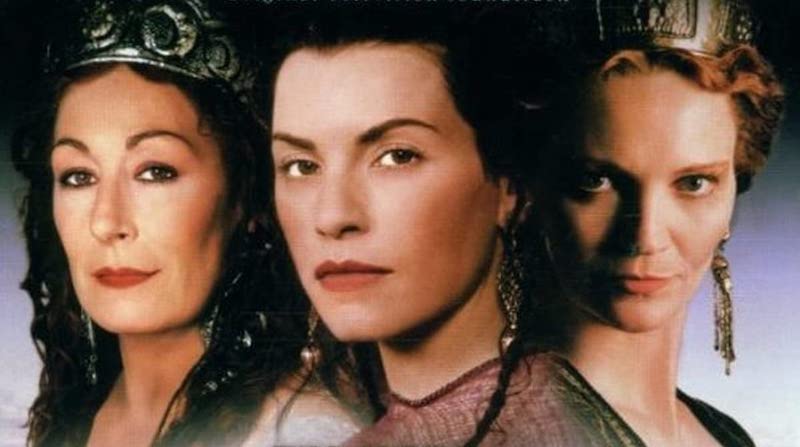
Likewise, could I re-read the “feminist masterpiece” Mists of Avalon knowing how she sexually abused her daughter from the age 3-12 (should I add “allegedly” here?) and how she remained silent about the child molestation by her husband, for which he received multiple convictions? No, when finding that out, Avalon and other stray MZBs left our house. I wouldn’t be able to read them without adding a mental “yes, but you abused your daughter,” after each “strong female protagonist” bit of writing. This, also because she’s so very present in her books: the author may be dead to me, but it’s not a case of Death of the Author. Less clear-cut, of course, are films, the products of many hands and many talents: auteur films from the likes of Roman Polanski or Woody Allen may have lost their gloss, but films produced by Harvey Weinstein, not so much.
Then there are films that I can enjoy, though I won’t support the author. Don’t @ me; the first Twilight film isn’t bad. However, as I will not support the Mormon church and their wacky and homophobic beliefs, and knowing that Stephenie Meyer is a member of the church and will pay 10% tithe of all money she earns, I’ll not see a single penny of mine go towards her. Likewise for noted transphobe J.K. Rowling. And sometimes I’m just petty: a noted horror writer was rude to me in a Facebook group, so his books went from my shelf to the charity box.
And then you’ve got authors whose attitudes where, perhaps, “of their time”. How do you deal with sexism and racism in works from an era where these were the standard? Firstly, there is the work itself: is it unreadable? H. Rider Haggard is at times patronising about Black people and too often falls into the Mighty Whitey or White Man’s Burden tropes, but you can read he’s sympathetic towards his major Black characters. You feel he’s trying at least, as opposed to for example Edgar Wallace in his Sanders of the River stories. Rider Haggard I’ll happily read – She, for all its faults, is a powerful work, in which the Mighty Whitey’s rule is not at portrayed as entirely benevolent. Wallace’s “gunboat diplomacy”, however, I can do without. Then over to the people “behind the page”; what of H.P. Lovecraft, for instance? It’s pretty well known that the Weird Tales stalwart and Call of Cthulhu writer was racist. But, which white man in the 1920s and ’30s wasn’t? To answer this, I’m aided by the question: “How would they vote, now?”
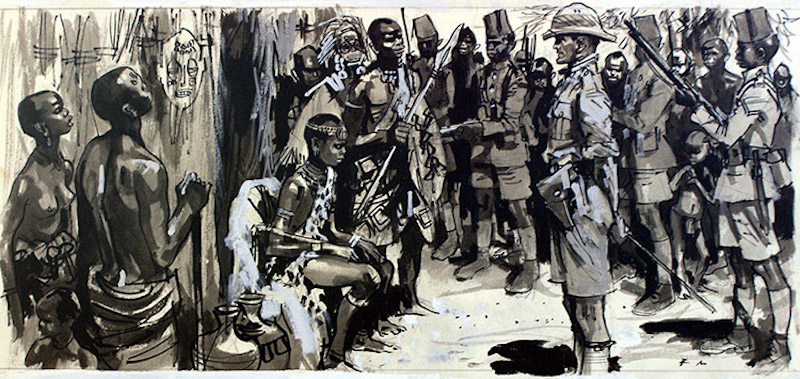
I believe that HPL would’ve voted Trump, would’ve been very much in favour of The Wall, and I’d dare go as far as to say that he’d be liable to adhere to some QAnon trappings. He was a learned man, had ample opportunity to create a broader worldview, but stubbornly and unapologetically refused to do so. That racism is part and parcel of stories like Shadow Over Innsmouth is extensively documented.Now, Lovecraft scholar Bobby Derie, in his Deep Cuts, has chronicled some of HPL’s real life encounters with Black people. It’s worse than I imagined. In 1933 he wrote of Hitler: I’d like to see Hitler wipe Greater New York clean with poison gas—giving masks to the few remaining people of Aryan culture (even if of Semitic ancestry). The place needs fumigation & a fresh start. (If Harlem didn’t get any masks, I’d shed no tears ….. & the same goes for the dago slums!)
Compare this with what Robert E. Howard wrote on Nazi Germany, in a 1933 letter to Lovecraft: I might also point out that no one has ever been hanged in Texas for a witch, and that we have never persecuted any class or race because of its religious beliefs or chance of birth; nor have we ever banned or burned any books, as the “civilized” Nazis are now doing in “civilized” Germany.
Both letters are from 1933; before the concentration camps, before the worst excesses of the Reich, yet the writing was already on the wall, and with his “poison gas” comment, Lovecraft of course hearkens back to World War I gas attacks, so we’re not talking abstracts here. What (finally) did it for me was Derie’s quoting of a letter Lovecraft wrote in 1922. To colleagues and others further removed he could be polite, even to a Black editor, but writing to close family we get the unfiltered HPL, not only drawing a link between apes and Black people, but also using a slur frequently used by slave holders for Black men: Before the chimpanzee cage; gazing with rapt interest, & unconscious of the time, we noted two huge, jet-black buck niggers; one of them—curiously enough—in army uniform with a very businesslike trench helmet.
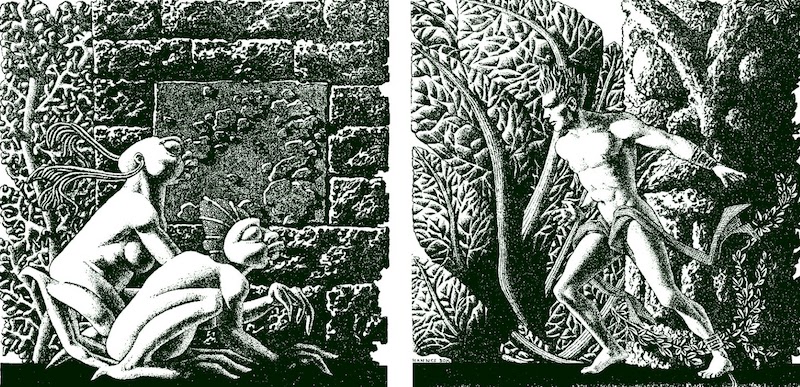
But how about Robert E. Howard then? Yes, he was racist too. However, his is a more tangled web where very bad portrayals of Black people go hand in hand with sympathetic descriptions of non-white characters. In his article Bran Mak Morn: Social Justice Warrior Jason Ray Carney writes about the story Worms of the Earth as a story about oppression, yet recognises that it is also written against a theoretical background of inter-war racist pseudoscience. While Lovecraft travelled and lived in New York for a spell, Howard pretty much stayed in Texas, and his literary influences go back decades, so there seems to be an element of ignorance too, less wilful than Lovecraft’s.
Howard’s ambivalence and confusion regarding race is can be illustrated with a 1932 letter to Lovecraft: I am not yet able to understand my own preference for these so-called Picts. Bran Mak Morn has not changed in the years; he is exactly as he leaped full-grown into my mind – a pantherish man of medium height with inscrutable black eyes, black hair and dark skin. This was not my own type; I was blond and rather above medium size than below. Most of my friends were of the same mold. Pronounced brunet types such as this were mainly represented by Mexicans and Indians, whom I disliked.

Howard’s more blatant racism (and sexism) seem to mainly occur in the more cliché Conan stories, which makes me wonder whether he wrote them pandering to a market which he knew was receptive to such tropes, much like he got the coveted cover spot by including lesbian flogging. This doesn’t excuse racism but implies a similar cultural landscape to today, in which it was a choice to act, or not, on principles of equality; in Howard’s case, earning his daily bread seems to have won out in the end. What for me is important is that Howard shows the capacity to grow and learn. Had he lived, I think he’d have enlisted to punch Nazis in WWII, shoulder to shoulder with Black soldiers. Lovecraft, I think, would merely bemoan the loss of American, Aryan, life and prudently keep his deeper thoughts from polite society.
With Derie’s work, and in particular discussions around the television series Lovecraft Country, a taking stock of sorts is underway. The Mythos, stories based on Lovecraft’s Cthulhu and other cosmic horrors, is not to be scrapped completely, but conversations like this make it easier to discern which implicit and explicit elements to get rid of, and which to keep and foster. I am not convinced that a similar consensus has been reached around Howard’s work. Due to its more ambiguous nature, fans roughly fall into the camps of, “I like it, though it’s flawed, and we need to talk about it,” and “I like it just as it is. No SJW in my books!” Howard’s Conan stories, and the Sword & Sorcery genre in general, were discovered by many in their teens, and it’s hard for some to reconcile their undeveloped teenage views and nostalgia with a more adult, critical view. One publisher of a recent S&S anthology states, amongst other dog whistles: No political correctness and No social justice warriors.
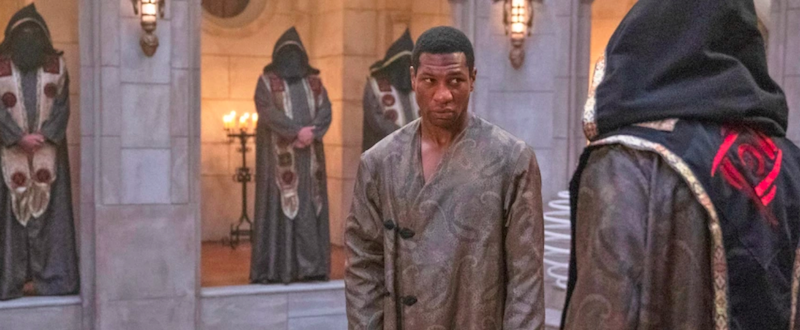
Even so, with a recent flux of podcasts like The Cromcast (their episode on The Moon of Skulls, on racism in the Solomon Kane stories, is a must), Rogues in the House and Appendix N, all looking at the genre from a critical perspective, as well as a host of magazines who aim to make the genre about more than Manly White Men, the genre is slowly emerging from its unreconstructed ghetto. Robert E. Howard himself can yet be redeemed too; I just finished rereading the Kull stories, and found little racism or sexism in them: women are written with agency and personality, and I got the feeling that Kull’s Pictish, and non-white, brother in arms Brule is far wiser and hardly less skilled a fighter than Kull is. Then, as was pointed out by commenter Cora Buhlert: Yes, he was prejudiced and yes, there are racist bits in his fiction, but he also had Kull smash Valusia’s miscegenation laws with his battle axe.
Adaptations too need not be uncritical, and can be transformative. The Dark Horse Conan comics were generally well received, though Becky Cloonan’s portrayal of Conan was derided as “too thin.” Aside from this being a younger Conan and previous Conans perhaps having been drawn “too muscular,” I also wonder how much misogyny against a female artist has played a part in its reception. Cloonan drew the adaptation of Howard’s Queen of the Black Coast, as scripted by Brian Wood. Wood has a history of harassing women, and is a good example of Death of the Author. The adaptation, despite Wood’s interpolations, is still predominantly Howard’s story, and Cloonan’s art is worth sticking around for, so I don’t feel that urge to throw it out; Wood did lose his gig at Dark Horse when word got out, which I feel is just.
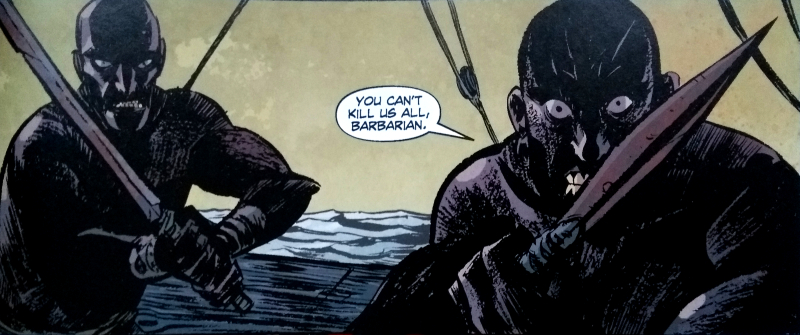
What strikes me on reading, and in particularly viewing, the comic is how it deals with its crew of Black pirates. When Conan first encounters them, they are (in Howard’s prose) “painted and plumed, and mostly naked, brandishing spears and spotted shields” with their white queen Bêlit forming “a dazzling contrast to the glossy ebon hides about it.” Cloonan depicts them as anonymous, almost black shapes with empty eyes and a suggestion of sharpened teeth; the idea of the savage as a 1930s reader, and a young Conan, would have it.
Conan joins the pirate queen on the Tigress and becomes the Mighty Whitey himself next to her. But as the story goes on, we get to know some of the crew better, like old N’Yaga and sub-Chief N’Gora. The language gets toned down a bit to blacks, black warriors, with huge muscles coiling and straining under their ebon skin when they try to shift a stone altar; terms which, aside from the words black and ebon were used to describe Conan. Later still, it’s N’Gora and his comrades. Cloonan’s pirates too morph into recognisable individuals, away from stereotypical depictions.
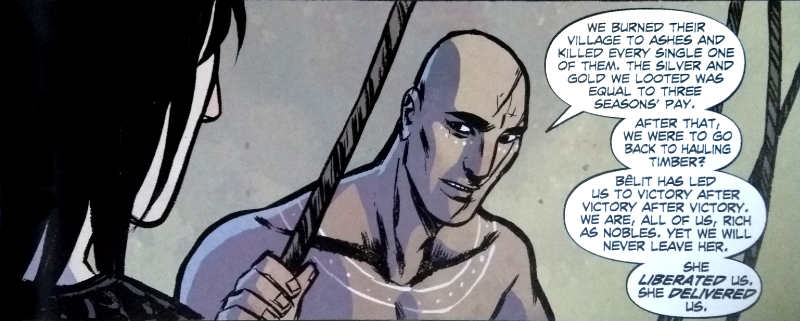
So, this is what we can do with what we don’t like; certain writers and artists we can take off our shelves, and not spend our coin on. Genres with a history of racism and sexism we can investigate and then transform and subvert. Inclusivity, in 2021, is a must, yet it involves excluding or changing that which is toxic. Because – who needs the presence of a writer who (“but think of the children!”) would want women barred from female toilets? Who’d want a Mythos that espouses fear of strangers, when those “strangers” are our neighbours and colleagues? What is a Heroic Fantasy fandom which cannot imagine heroes who are different but equal to the white, heterosexual male?


2 thoughts on “Control Your Shelves”